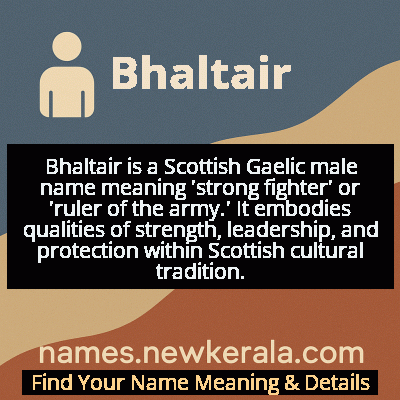Bhaltair Name Meaning & Details
Origin, Popularity, Numerology Analysis & Name Meaning of Bhaltair
Discover the origin, meaning, and cultural significance of the name BHALTAIR. Delve into its historical roots and explore the lasting impact it has had on communities and traditions.
Name
Bhaltair
Gender
Male
Origin
Scottish
Lucky Number
8
Meaning of the Name - Bhaltair
Bhaltair is a Scottish Gaelic male name meaning 'strong fighter' or 'ruler of the army.' It embodies qualities of strength, leadership, and protection within Scottish cultural tradition.
Bhaltair - Complete Numerology Analysis
Your Numerology Number
Based on Pythagorean Numerology System
Ruling Planet
Saturn
Positive Nature
Ambitious, efficient, realistic, and authoritative.
Negative Traits
Materialistic, stressed, confrontational, and can be overly ambitious.
Lucky Colours
Dark blue, black.
Lucky Days
Saturday.
Lucky Stones
Blue sapphire, amethyst.
Harmony Numbers
2, 4, 6.
Best Suited Professions
Business leaders, managers, financial services, law enforcement.
What People Like About You
Leadership, determination, organizational skills.
Famous People Named Bhaltair
Bhaltair MacIlleMhìcheil
Gaelic poet
Renowned Scottish Gaelic poet from Skye, known for his powerful verse and preservation of Gaelic literary traditions
Bhaltair Siosal
Clan chief
Influential chief of Clan Chisholm who strengthened the clan's position in the Scottish Highlands
Bhaltair MacGill-Eain
Educator and scholar
Prominent Gaelic educator who contributed significantly to Scottish Gaelic language preservation and education
Bhaltair Dòmhnallach
Musician and composer
Accomplished Scottish Gaelic musician known for traditional compositions and cultural revival efforts
Name Variations & International Equivalents
Click on blue names to explore their detailed meanings. Gray names with will be available soon.
Cultural & Historical Significance
The name's persistence through centuries of linguistic and cultural change demonstrates its enduring appeal within Scottish Gaelic tradition, representing a bridge between Norse, Norman, and native Gaelic cultures that shaped medieval Scotland. During the Jacobite uprisings and subsequent Highland Clearances, the name Bhaltair remained in use among Gaelic families as a symbol of cultural continuity and resistance to assimilation, helping preserve Scottish identity during periods of significant cultural pressure. In modern times, the name continues to represent cultural pride and serves as a tangible connection to Scotland's Gaelic linguistic heritage.
Extended Personality Analysis
Individuals named Bhaltair are typically perceived as possessing strong leadership qualities, resilience, and a determined character that reflects the name's warrior origins. They often exhibit natural authority and confidence, combined with a protective instinct toward those in their care. This combination of traits makes them effective in positions of responsibility where decisive action and steadfastness are required. Their approach to challenges tends to be methodical and persistent rather than impulsive.
Beyond their strong exterior, Bhaltairs are often known for their loyalty and deep sense of honor, valuing tradition and principles highly. While they can appear reserved initially, those who earn their trust discover individuals with strong convictions, reliability, and a dry wit that emerges in comfortable company. Their strength is typically balanced by a sense of fairness and justice, making them respected figures in both personal and professional contexts who inspire confidence through their consistent character and dependable nature.
Modern Usage & Popularity
In contemporary times, Bhaltair remains a relatively uncommon but culturally significant name, primarily used within Scottish Gaelic-speaking communities and among families seeking to honor their Scottish heritage. While it hasn't appeared on mainstream popularity charts in recent decades, it experiences periodic revivals during cultural renaissance movements focused on preserving Gaelic language and traditions. The name is most frequently encountered in the Scottish Highlands, Hebrides, and among diaspora communities in Canada, the United States, and Australia where Scottish cultural identity remains strong. Modern usage often reflects a conscious choice to maintain linguistic and cultural connections rather than following naming trends, making it a marker of cultural pride and identity preservation. Recent years have seen increased interest in traditional Gaelic names as part of broader Celtic cultural revival movements.
Symbolic & Spiritual Meanings
Symbolically, Bhaltair represents strength, leadership, and cultural continuity within the Scottish Gaelic tradition. The name carries connotations of protection and guardianship, reflecting the historical role of clan leaders and warriors in Scottish society. It symbolizes the resilience of Gaelic culture through centuries of political and social change, serving as a living connection to Scotland's linguistic heritage. Metaphorically, the name embodies the concept of 'inner strength'—the combination of physical courage and moral fortitude that defines true leadership. It also represents cultural endurance, as the persistence of this name through generations mirrors the survival of Gaelic language and traditions against significant historical pressures, making it a powerful symbol of identity preservation and cultural pride.

